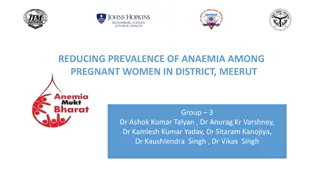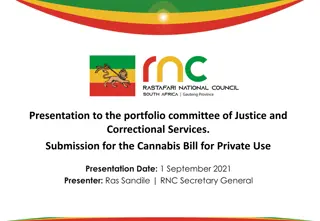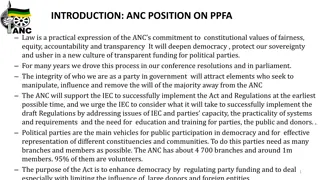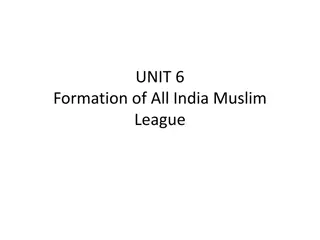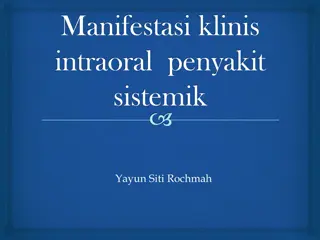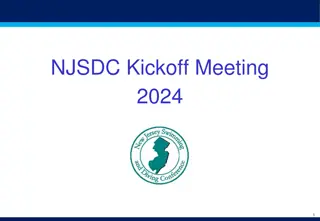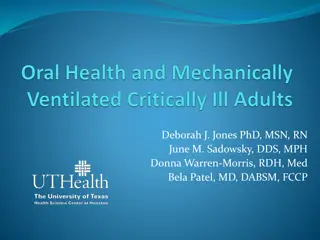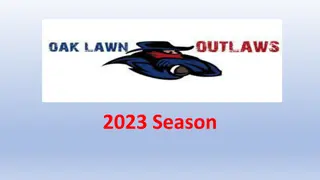ANC Women's League Oral Submission on Expropriation Bill [B23.2020]
ANC Women's League presented an oral submission to the Portfolio Committee on Public Works and Infrastructure regarding the Expropriation Bill [B23.2020]. The submission focuses on the history of land and property in South Africa, advocating for the expropriation and reparations of property for the benefit of citizens, especially the poor and vulnerable. It discusses the difference between compensation and reparations, emphasizing the need for reparations to address the injustices of the past. The submission highlights the importance of working out reparations at a governmental level based on established international standards.
Download Presentation

Please find below an Image/Link to download the presentation.
The content on the website is provided AS IS for your information and personal use only. It may not be sold, licensed, or shared on other websites without obtaining consent from the author.If you encounter any issues during the download, it is possible that the publisher has removed the file from their server.
You are allowed to download the files provided on this website for personal or commercial use, subject to the condition that they are used lawfully. All files are the property of their respective owners.
The content on the website is provided AS IS for your information and personal use only. It may not be sold, licensed, or shared on other websites without obtaining consent from the author.
E N D
Presentation Transcript
ANC Women s League Oral Submission to the Portfolio Committee on Public Works and Infrastructure on the Expropriation Bill [B23 2020]
Purpose of the Bill should be to provide for the expropriation and reparation of property, and land for the best interests of the citizens of south Africa, and to provide for matters connected therewith. History of Land and Property in South Africa History of Land and Property in South Africa is one of both violent and non-violent means such as racist legislative means by colonial powers and the apartheid regime to deprive African people of their land and property thus consequential interfering with the cultural and spiritual connectedness that African s had with the land. Land for African people is more than a source of financial resource, it plays a central role the culture and spirituality of the community. INTRODUCTION Our Submissions It is our submission as the ANC s women s league that an amended version of the Bills in line with our written submission will empower the government to expropriate the land of the beneficiaries of the obnoxious rules of apartheid for the benefit and empowerment of the poor, and the most vulnerable members of the community after following due process and for either compensation or without compensation depending on the history of the land.
Compensation versus Reparations Compensation is based on the market value of the land, i.e., what the settler will lose economically; The same loss and more, was suffered by those from whom the land was dispossessed. Hence: (1) No compensation for land that was dispossessed through an unprovoked act of aggression, characterised by external invasion, colonisation, and culmination into the 1912 Land Act CHAPTER 5 COMPENSATION FOR EXPROPRIATION (2) We recommend the total replacement of the Chapter with Reparations instead (3) Payment of Reparations to those formerly dispossessed: An act of repairing the damage done, through loss of spiritual, economic, and self- governing activity. This loss since dispossession, is the price of reparations
Facts About Reparations Reparations are the action of making amends for a wrong one has done, by providing payment or other assistance to those who have been wronged: (1) Reconciliation is a process; reparations are the first step. CHAPTER 5 COMPENSATION FOR EXPROPRIATION cont. (2) Reparations are a form restorative justice, not retribution or a punitive in nature. (3) Research has shown that Reparations are never popular: In 1951, only 29% of West Germans believed they owed Jews restitution for the Holocaust, Yet - Despite the protests, the agreement was signed in September 1952, and West Germany paid Israel 3 billion marks over the next 14 years; 450 million marks were paid to the World Jewish Congress. The payments were made to the State of Israel as the heir to those victims who had no surviving family.
Working out Reparations Reparations should be worked out at governmental level, using established international standards of calculation and payment, the state having consulted widely with Afrikans to work out the best possible formula. However, this is not a rocket science invention the principle has been established under the UN, outside of Israel and Germany. For instance, the US paid reparations to Japanese Americans for violation of their human rights after Pearl Harbour. CHAPTER 5 COMPENSATION FOR EXPROPRIATION cont. . Our recommendation is compensation largely by clan, ethnicity, and in rare cases, at individual level. The former two entities allow for redistributed land and reparations funds to be used at cooperative, joint, or community business ventures for sustainable development. As Afrikan women as the primary beneficiaries within these clans and ethnicities, especially as it pertains to women in rural and communal communities. Why? Afrikan women were the agriculturalists precolonially, which allowed them to manage the whole food chain, including trade and markets. Dispossession, introduction of the cash crop, the British written Customary Law, and colonial patriarchy, reduced to woman to the property and dependant of the man.
Working out Reparations Reparations should be worked out at governmental level, using established international standards of calculation and payment, the state having consulted widely with Afrikans to work out the best possible formula. However, this is not a rocket science invention the principle has been established under the UN, outside of Israel and Germany. For instance, the US paid reparations to Japanese Americans for violation of their human rights after Pearl Harbour. CHAPTER 5 COMPENSATION FOR EXPROPRIATION cont. . Our recommendation is compensation largely by clan, ethnicity, and in rare cases, at individual level. The former two entities allow for redistributed land and reparations funds to be used at cooperative, joint, or community business ventures for sustainable development. As Afrikan women as the primary beneficiaries within these clans and ethnicities, especially as it pertains to women in rural and communal communities. Why? Afrikan women were the agriculturalists precolonially, which allowed them to manage the whole food chain, including trade and markets. Dispossession, introduction of the cash crop, the British written Customary Law, and colonial patriarchy, reduced to woman to the property and dependant of the man.
CHAPTER 6 MEDIATION AND 1. The only issue is the time periods stipulated in this section. 2. . Matters brought before court or mediation must be speedily resolved to ensure certainty for DETERMINATION BY the parties, a provision in the regulations attached to the Bill, needs to deal with this aspect. COURT
CHAPTER 1 DEFINITIONS CHAPTER 7 URGENT EXPROPRIATION We merely desire that the 30 days period need to be reduced to 15 days. APPLICATIONS OF ACT
We, therefore, strongly discourage having a chapter to deal with the withdrawal of expropriation in the bill. We find it illogical that after all the processes followed to arrive to the conclusion that it in in the public interest to expropriate a specific property, it may arise later that it is no longer in the public interest and it warrants a withdrawal. We recommend that all potential loopholes be closed to ensure the generational applicability and success of the Bill in order to yield the desired impact. This Chapter could be better placed as a section under Chapter 7 to address issues that may arise as a result of urgent expropriation. Should a decision to enter into urgent expropriation of a specific property no longer be in the public interest, there should be theoption available to withdraw such a decision. However, this should be a case-by-case review process rather than an open position held to be applicable to all expropriation decisions. CHAPTER 8 WITHDRAWAL OF EXPROPRIATION
The ANCWL endorses the powers of the Minister and proposes that the Bill outline the powers of the Ministers of the Department of Public Works and the Department Human settlement as secondary stakeholders. CHAPTER 2 POWERS OF THE MINISTER TO EXPROPRIATE
Section 5(1)(a) Suitability The ANCWL endorses the proposal and acknowledges the importance to conduct thorough evaluation and investigations and propose the adoption of an efficient coordinated system that will ensure that the suitable land is expropriated. A lack of a such a system in the past resulted in government purchasing unsuitable land which is currently contributing to the land demand pressure. The need for land is South Africa is complex and both the immediate need for land for residential purpose and agricultural farming should be accounted for. CHAPTER 3 INVESTIGATION AND VALUATION OF PROPERTY
Section 5(1)(b) Registered/Unregistered The ANCWL proposes the publication of the outcome of investigations, for transparency to enable us to women to support women aware and claim their rights either as registered or unregistered owners. We acknowledge that women are not empowered to participate in issues affecting them, a lack of transparency in this regard can overlook the existence of registered or unregistered rights owned by women. CHAPTER 3 INVESTIGATION AND VALUATION OF PROPERTY cont.
Section 5(2)(a) Authority This clause should be aligned with the method to be adopted in the case of compensation, with the options of cash or instalment payment. Section 5(4)(a) Valuer CHAPTER 3 INVESTIGATION AND VALUATION OF PROPERTY cont. Anyone can have access to documents to prove ownership, we propose commitment to thorough investigation to involve persons or stakeholders to validate documents. Failure to validate documents may result in women being denied their property rights, especially upon death of their spouse, especially women married under customary law.
Section 7: Notice of Intention to Expropriate The notice must not only be served but it must be explained in the language of the owner and/or occupier or unregistered rights holder. Merely, serving the notice would result in several illiterate owners, occupiers and unregistered rights holder not fully understanding their obligations and rights in respect to the notice, especially section 11(5) which essential holds an owner financial liable for non- disclosure of persons with unregistered rights over the land or property. CHAPTER 4 INTENTION TO EXPROPRIATE AND EXPROPRIATION OF PROPERTY
Section 7(2) (c) - No Cost there must be no cost for obtaining the purpose of the expropriation. CHAPTER 4 INTENTION TO EXPROPRIATE AND EXPROPRIATION OF PROPERTY cont. Section 7(2)(g)(iv) - Sign Language Sign Language must be included, despite recognised as an official language, in be inclusive of persons living with disabilities.
Section 8: Notice of Expropriation The date of vested ownership is the date of expropriation, perhaps ownership occurs on the date of transfer. This section creates an uncertainty around ownership, possession, and transfer. CHAPTER 4 INTENTION TO EXPROPRIATE AND EXPROPRIATION OF PROPERTY cont. This dispute must be referred to the Courts for determination, however it will ultimately result in expropriation matters being stuck in Court. This leads to a difficult situation where the expropriating authority is the owner of the land without having compensated the owner/occupier and/or unregistered right holder.
Section 8: Notice of Expropriationcont. CHAPTER 4 INTENTION TO EXPROPRIATE AND EXPROPRIATION OF PROPERTY cont. The Minister s regulations may perhaps provide clear time periods for expropriation of land and property cases to be dealt with, or the Minister may empower the Land Court to specifically have exclusive jurisdiction to adjudicate matters under the Expropriation Bill.
Section 9: Vesting and Possession of Expropriated Property CHAPTER 4 INTENTION TO EXPROPRIATE AND EXPROPRIATION OF PROPERTY cont. There must be a record at the Deeds Registry of expropriation and transfer: withdrawal of expropriation
![ANC Women's League Oral Submission on Expropriation Bill [B23.2020]](https://cdn1.slideorbit.com/136076/slide1-n.jpg)


